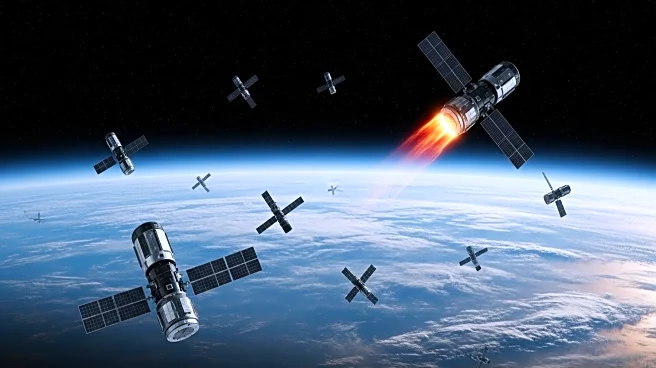What is the story about?
What's Happening?
Elon Musk's Starlink satellites are increasingly re-entering Earth's atmosphere, with approximately one to two satellites per day burning up as fiery fireballs. This phenomenon has sparked a dialogue about orbital safety and debris management. The re-entry of these satellites highlights the need for improved tracking technologies to predict and monitor their trajectories, aiming to prevent potential collisions. The frequency of these events underscores the necessity for international cooperation in space traffic management and the establishment of heightened regulatory standards to ensure the safety and sustainability of space operations.
Why It's Important?
The re-entry of Starlink satellites poses significant environmental concerns due to the release of particulates into the atmosphere during the burning process. Environmentalists argue that this issue requires more attention and stringent regulations to mitigate its impact. The situation emphasizes the need for international collaborations to develop sustainable space practices that address environmental and safety risks. As the number of satellites increases, the potential for collisions and debris-related incidents grows, necessitating robust management strategies to protect both space operations and the Earth's environment.
What's Next?
The ongoing dialogue around Starlink satellite re-entries is likely to lead to discussions among international stakeholders about establishing comprehensive space traffic management systems. These systems would aim to enhance tracking technologies and implement regulatory standards that ensure safe and sustainable space operations. Additionally, there may be increased pressure on governments and private enterprises to balance the need for technological advancement with environmental protection, potentially leading to new policies and collaborations focused on minimizing the environmental footprint of satellite operations.
Beyond the Headlines
The re-entry of Starlink satellites could trigger long-term shifts in how space operations are conducted, with a growing emphasis on sustainability and environmental responsibility. This development may lead to ethical considerations regarding the impact of space technology on Earth's ecosystems and the need for responsible stewardship of space resources. As awareness of these issues grows, there could be a cultural shift towards prioritizing environmental considerations in technological advancements, influencing future space exploration and satellite deployment strategies.















